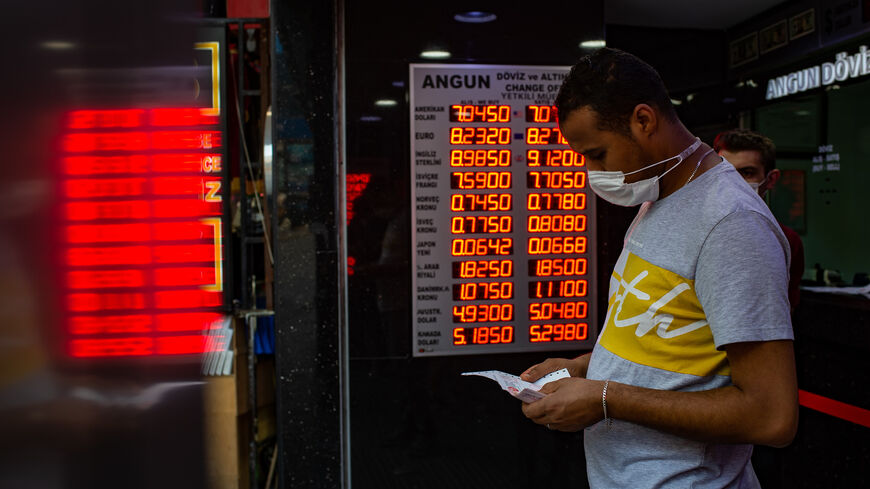Turkish markets remain on edge ahead of Sunday’s presidential election runoff as apprehension builds up that President Recep Tayyip Erdogan’s reelection would spell deeper economic woes and send the Turkish lira into a new tailspin.
Erdogan, whose controversial low-rate policy is widely blamed for Turkey’s economic turmoil, narrowly missed an outright victory in the May 14 presidential vote, defying opinion polls most of which had put his challenger Kemal Kilicdaroglu in the lead. He got 49.5% of the vote, just below the 50% threshold, while Kilicdaroglu, who had promised a return to economic orthodoxy, garnered 44.9%.
The vote was followed by a market rout as the prospect of Erdogan winning the runoff dampened hopes for an end to his unorthodox policies, marked by rate cuts despite soaring inflation and selling central bank reserves to prop up the embattled lira. Erdogan asserted to CNN last week that he would make no change to his economic policy if he wins a third term to govern the country.
Just two days after the first-round vote, the central bank issued fresh rules for banks aimed at curbing lending, including cash withdrawals on credit cards, which people often use as a cheaper alternative to loans. To force banks to heed the restrictions, the central bank obliged them to hold additional low-yielding government bonds for such transactions by their customers.
A rush for cash
Underlying the move was Ankara’s concern that people would rush to get cash advances to buy hard currency or gold to hedge themselves against the lira’s possible depreciation after the polls. Demand for foreign exchange and gold had risen sharply in the run-up to the elections and fresh currency jitters ahead of the runoff could harm Erdogan’s chances of reelection. Defending the measure in a May 18 television interview, Vice President Fuat Oktay denounced the use of cash advances to buy hard currency or gold for “under-the-pillow investments” that contribute nothing to the economy. The regulation, he said, targeted high-income bank customers with card limits above 50,000 liras ($2,500).
The measures provoked a backlash among citizens as some banks halted cash advances or limited the use of credit cards among other restrictions. For many people in Turkey, cash withdrawals from credit cards are the only means to make ends meet amid a severe cost-of-living crisis, with inflation sitting at 44% after peaking to 85.5% in October. Even some ruling party members denounced the restrictions and, eventually, the central bank stepped back from the credit card regulation on May 19.
Has Turkey’s foreign exchange crunch become so grave that the authorities would limit even cash withdrawals from credit cards to keep the lira from plunging? The fragility is that alarming indeed and many fear it could become unmanageable soon.
Lying at the core of the fears is the near-exhaustion of the central bank’s foreign exchange ammunition. As of May 12, the bank’s gross gold and foreign exchange reserves totaled $105.1 billion and its net international reserves amounted to a mere $2.3 billion, the lowest levels since 2002. In fact, the net foreign exchange reserves stood at a negative $58 billion once outstanding currency swaps and deposits by foreign countries were deducted. Currency swaps with Qatar, the United Arab Emirates, China and South Korea and deposits from Saudi Arabia, Azerbaijan and Libya totaled some $36 billion.
Ankara has avoided an even worse outlook thanks to a special deposit scheme to rein in the rush for dollars, introduced after a full-blown currency crisis in December 2021. Under the scheme, the treasury and the central bank compensate lira depositors for any losses they incur from the fall of the currency. As of May 12, deposits in the scheme were worth close to $120 billion, up from $55 billion a year ago, according to official data.
By encouraging depositors to convert their hard currency to liras and attracting savings that could have otherwise been dollarized, the scheme has become the central bank’s main ammunition in defending the lira. This, however, has come at the cost of 182 billion liras ($9.2 billion) in treasury and central bank funds paid to depositors to compensate them for the depreciation of the lira.
Russia to the rescue
Financial gestures by Russia are seen as another important factor that has helped the central bank stay afloat, manifesting the rapport between Erdogan and Russian President Vladimir Putin. The data related to Russia’s gestures are not entirely transparent, but Putin is widely believed to have been tacitly backing Erdogan to help him win the elections.
Russia’s publicly known support began last summer as its state-owned nuclear energy company Rosatom started to wire dollars to its subsidiary in Turkey, which is building the country’s first nuclear power plant. The transfers have reportedly totaled up to $10 billion. There has been speculation about Russian oligarchs also bringing money to Turkey amid a significant increase in home purchases by Russians and new companies created with Russian partners since the war in Ukraine.
Furthermore, Russia has agreed to postpone a $600 million Turkish gas bill to 2024 as part of a deal under which up to $4 billion in gas payments may be deferred until next year, Reuters reported earlier this month. In a sign corroborating Russian sales on credit, Turkey’s state gas company BOTAS, which buys hard currency from the central bank to pay for energy imports, has not made such transactions for a while.
The drain in the central bank reserves owes also to the bank’s sale of gold to the market to meet surging local demand in recent weeks as people scramble to protect the value of their savings. The central bank’s gold reserves stood at 687 tons on May 12, down from 844 tons on March 10.







